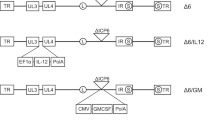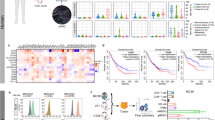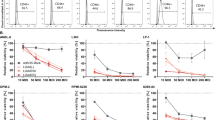Abstract
The purpose of this study was to examine the tumor specificity, cytotoxicity and the antitumor activity of two conditionally replicating oncolytic adenoviruses, SKL001 and SKL002, which expressed granulocyte macrophage colony-stimulating factor (GM-CSF) or anti-cytotoxic T lymphocyte-associated antigen-4 (CTLA4) antibody, respectively, and determine their antitumor efficacy in A549 lung tumor model, B16F10 mouse melanoma tumor model and CMT-64 mouse small lung carcinoma tumor model. Virus yield and cytotoxicity were used to determine tumor specificity and virus replication-mediated cytotoxicity of SKL001 and SKL002 in a panel of human tumor cell lines and primary cells in vitro. Two subcutaneous (s.c.) tumor nexograft tumor models were used to assess their antitumor activity. Under the control of the E2F promoter, the expression of E1a genes appeared only in tumor cells, whereas the wild-type Ad5 expressed its E1a genes in both tumor cells and normal cells. GM-CSF and anti-CTLA4 production were significantly higher in tumor cells than normal cells. SKL001 and SKL002 replicated in Rb-defective cell lines as efficiently as wild-type adenovirus but produced 100-fold less virus in normal human cells. SKL001 and SKL002 was up to 1000-fold more cytotoxic in Rb pathway–defective human tumor cells in comparison with normal human cells. Antitumor activity of SKL001 and SKL002 following intravenous administration was shown in a human lung A549 s.c. xenograft tumor model and mouse B16F10 melanoma tumor model when compared with phosphate-buffered saline treatment. In immune-competent mice, the addition of GM-CSF produced a stronger antitumor activity and induced a higher number of mature dendritic cells and macrophages, whereas additive antitumor activity was observed in the group when SKL001 and SKL002 were combined. In vitro and in vivo studies showed the selective replication, cytotoxicity, gene production and antitumor efficacy of SKL001 and SKL002 in human tumor model, suggesting a potential utility of this oncolytic agent for the treatment of human cancer. Further studies are warranted to show the role of human GM-CSF and anti-CTLA4 antibody in the antitumor efficacy of these two oncolytic viruses.
This is a preview of subscription content, access via your institution
Access options
Subscribe to this journal
Receive 12 print issues and online access
$259.00 per year
only $21.58 per issue
Buy this article
- Purchase on Springer Link
- Instant access to full article PDF
Prices may be subject to local taxes which are calculated during checkout






Similar content being viewed by others
References
Heo J, Reid T, Ruo L, Breitbach CJ, Rose S, Bloomston M et al. Randomized dose-finding clinical trial of oncolytic immunotherapeutic vaccinia JX-594 in liver cancer. Nat Med 2013; 19: 329–336.
Oberg D, Yanover E, Adam V, Sweeney K, Costas C, Lemoine NR et al. Improved potency and selectivity of an oncolytic E1ACR2 and E1B19K deleted adenoviral mutant in prostate and pancreatic cancers. Clin Cancer Res 2010; 16: 541–553.
Lei N, Shen FB, Chang JH, Wang L, Li H, Yang C et al. An oncolytic adenovirus expressing granulocyte macrophage colony-stimulating factor shows improved specificity and efficacy for treating human solid tumors. Cancer Gene Ther 2009; 16: 33–43.
Heise C, Hermiston T, Johnson L, Brooks G, Sampson-Johannes A, Williams A et al. An adenovirus E1A mutant that demonstrates potent and selective systemic anti-tumoral efficacy. Nat Med 2000; 6: 1134–1139.
Cerullo V, Pesonen S, Diaconu I, Escutenaire S, Arstila PT, Ugolini M et al. Oncolytic adenovirus coding for granulocyte macrophage colony-stimulating factor induces antitumoral immunity in cancer patients. Cancer Res 2010; 70: 4297–4309.
Pesonen S, Diaconu I, Kangasniemi L, Ranki T, Kanerva A, Pesonen SK et al. Oncolytic immunotherapy of advanced solid tumors with a CD40L-expressing replicating adenovirus: assessment of safety and immunologic responses in patients. Cancer Res 2010; 72: 1621–1631.
Li Y, Idamakanti N, Arroyo T, Thorne S, Reid T, Nichols S et al. Dual promoter-controlled oncolytic adenovirus CG5757 has strong tumor selectivity and significant antitumor efficacy in preclinical models. Clin Cancer Res 2005; 11: 8845–8855.
Raki M, Kanerva A, Ristimaki A, Desmond RA, Chen DT, Ranki T et al. Combination of gemcitabine and Ad5/3-D 24, a tropism modified conditionally replicating adenovirus, for the treatment of ovarian cancer. Gene Ther 2005; 12: 1198–1205.
Jin J, Liu H, Yang C, Li G, Liu X, Qian Q et al. Effective gene-viral therapy of leukemia by a new fiber chimeric oncolytic adenovirus expressing TRAIL: in vitro and in vivo evaluation. Mol Cancer Ther 2009; 8: 1387–1396.
Koski A, Kangasniemi L, Escutenaire S, Pesonen S, Cerullo V, Diaconu I et al. Treatment of cancer patients with a serotype 5/3 chimeric oncolytic adenovirus expressing GMCSF. Mol Ther 2010; 18: 1874–1884.
Dranoff G, Jaffee E, Lazenby A, Golumbek P, Levitsky H, Brose K et al. Vaccination with irradiated tumor cells engineered to secrete murine granulocyte-macrophage colony stimulating factor stimulates potent, specific and long lasting anti-tumor immunity. Proc Natl Acad Sci USA 1993; 90: 3539–3543.
Ramesh N, Ge Y, Ennist DL, Zhu M, Mina M, Ganesh S et al. CG0070, a conditionally replicating granulocyte macrophage colony-stimulating factor -armed oncolytic adenovirus for the treatment of bladder cancer. Clin Cancer Res 2006; 12: 305–312.
Zhang J, Ramesh N, Chen Y, Li Y, Dilley J, Working P et al. Identification of human uroplakin ii promoter and its use in the construction of CG8840, a urothelium-specific adenovirus variant that eliminates established bladder tumors in combination with docetaxel. Cancer Res 2002; 62: 3743–3750.
Li Y, Yu DC, Chen Y, Amin P, Zhang H, Nguyen N et al. A hepatocellular carcinoma-specific adenovirus variant, CV890, eliminates distant human liver tumors in combination with doxorubicin. Cancer Res 2001; 61: 6428–6436.
Huang JH, Zhang SN, Choi KJ, Choi IK, Kim JH, Lee MG et al. Therapeutic and tumor-specific immunity induced by combination of dendritic cells and oncolytic adenovirus expressing IL-12 and 4-1BBL. Mol Ther 2010; 2: 264–274.
Lee YS, Kim JH, Choi KJ, Choi IK, Kim H, Cho S et al. Enhanced antitumor effect of oncolytic adenovirus expressing interleukin-12 and B7-1in an immunocompetent murine model. Clin Cancer Res 2006; 12: 5859–5868.
Hu JC, Coffin RS, Davis CJ, Graham NJ, Groves N, Guest PJ et al. A phase I study of OncoVEXGM-CSF,a second-generation oncolytic herpes simplex virus expressing granulocyte macrophage colony-stimulating factor. Clin Cancer Res 2006; 12: 6737–6747.
Ostrov DA, Shi W, Schwartz JC, Almo SC, Nathenson SG . Structure of murine CTLA-4 and its role in modulating T cell responsiveness. Science 2000; 290: 816–819.
Alegre ML, Frauwirth KA, Thompson CB . T-cell regulation by CD28 and CTLA-4. Nat Rev Immunol 2001; 1: 220–228.
Perkins D, Wang Z, Donovan C, He H, Mark D, Guan G et al. Regulation of CTLA-4 expression during T cell activation. J Immunol 1996; 156: 4154–4159.
Carreno BM, Collins M . The B7 family of ligands and its receptors: new pathways for costimulation and inhibition of immune responses. Annu Rev Immunol 2002; 20: 29–53.
Maker AV, Yang JC, Sherry RM, Topalian SL, Kammula US, Royal RE et al2006 Intrapatient dose escalation of anti-CTLA-4 antibody in patients with metastatic melanoma. J Immunother 1997; 29: 455–463.
Yang YF, Zou JP, Mu J, Wijesuriya R, Ono S, Walunas T et al. Enhanced induction of anti-tumor T-cell responses by cytotoxic T lymphocyte-associated molecule-4 blockade: the effect is manifested only at the restricted tumor-bearing stages. Cancer Res 1997; 57: 4036–4041.
Leach DR, Krummel MF, Allison JP . Enhancement of antitumor immunity by CTLA-4 blockade. Science 1996; 271: 1734–1736.
Kwon ED, Hurwitz AA, Foster BA, Madias C, Feldhaus AL, Greenberg NM et al. Manipulation of T cell costimulatory and inhibitory signals for immunotherapy of prostate cancer. Proc Natl Acad Sci USA 1997; 94: 8099–8103.
Reuben JM, Lee BN, Li C, Gomez-Navarro J, Bozon VA, Parker CA et al. Biologic and immunomodulatory events after CTLA-4 blockade with ticilimumab in patients with advanced malignant melanoma. Cancer 2006; 106: 2437–2444.
Chang DZ, Lomazow W, Joy Somberg C, Stan R, Perales MA . Granulocyte–macrophage colony stimulating factor: an adjuvant for cancer vaccines. Hematology 2004; 9: 207–215.
Fleetwood AJ, Cook AD, Hamilton JA . Functions of granulocyte-macrophage colony-stimulating factor. Crit Rev Immunol 2005; 25: 405–428.
Simmons AD, Moskalenko M, Creson J, Fang J, Yi S, VanRoey MJ et al. Local secretion of anti-CTLA-4 enhances the therapeutic efficacy of a cancer immunotherapy with reduced evidence of systemic autoimmunity. Cancer Immunol Immunother 2008; 57: 1263–1270.
Quezada SA, Peggs KS, Curran MA, Allison JP . CTLA4 blockade and GM-CSF combination immunotherapy alters the intratumor balance of effector and regulatory T cells. J Clin Invest 2006; 116: 1935–1945.
Hodi FS, Butler M, Oble DA, Seiden MV, Haluska FG, Kruse A et al. Immunologic and clinical effects of antibody blockade of cytotoxic T lymphocyte-associated antigen 4 in previously vaccinated cancer patients. Proc Natl Acad Sci USA 2008; 105: 3005–3010.
Parato KA, Senger D, Forsyth PA, Bell JC . Recent progress in the battle between oncolytic viruses and tumours. Nat Rev Cancer 2005; 5: 965–976.
Liu TC, Galanis E, Kirn D . Clinical trial results with oncolytic virotherapy: a century of promise, a decade of progress. Nat Clin Pract Oncol 2007; 4: 101–117.
Denizot F, Lang R . Rapid colorimetric assay for cell growth and survival modifications to the tetrazolium dye procedure giving improved sensitivity and eliability. J Immunol Methods 1986; 89: 271–277.
Reed L, Muench H . A simple method of estimating fifty percent endpoints. Am J Hyg 1938; 27: 493–497.
Edukulla R, Woller N, Mundt B, Knocke S, Gürlevik E, Saborowski M et al. Antitumoral immune response by recruitment and expansion of dendritic cells in tumors infected with telomerase-dependent oncolytic viruses. Cancer Res 2009; 69: 1448–1458.
Dias JD, Hemminki O, Diaconu I, Hirvinen M, Bonetti A, Guse K et al. Targeted cancer immunotherapy with oncolytic adenovirus coding for a fully human monoclonal antibody specific for CTLA-4. Gene Therapy 2011; 10: 1–11.
Kaushansky K, Lin N, Adamson JW . Interleukin 1 stimulates fibroblasts to synthesize granulocyte-macrophage and granulocyte colony-stimulating factors. Mechanism for the hematopoietic response to inflammation. J Clin Invest 1988; 81: 92–97.
Burke JM, Lamm DL, Meng MV, Nemunaitis JJ, Stephenson JJ, Arseneau JC et al. A first in human phase 1 study of CG0070, a GM-CSF expressing oncolytic adenovirus, for the treatment of nonmuscle invasive bladder cancer. J Urol 2012; 188: 2391–2397.
Fong L, Kwek SS, O'Brien S, Kavanagh B, McNeel DG, Weinberg V et al. potentiating endogenous antitumor immunity to prostate cancer through combination immunotherapy with CTLA4 blockade and GM-CSF. Cancer Res 2009; 69: 609–615.
Acknowledgements
This study was funded by the National Natural Science Foundation of China (81172175) and State’s ‘973’ grant (2012CB917104).
Author information
Authors and Affiliations
Corresponding authors
Ethics declarations
Competing interests
The authors declare no conflict of interest.
Rights and permissions
About this article
Cite this article
Du, T., Shi, G., Li, Y. et al. Tumor-specific oncolytic adenoviruses expressing granulocyte macrophage colony-stimulating factor or anti-CTLA4 antibody for the treatment of cancers. Cancer Gene Ther 21, 340–348 (2014). https://doi.org/10.1038/cgt.2014.34
Received:
Revised:
Accepted:
Published:
Issue Date:
DOI: https://doi.org/10.1038/cgt.2014.34
This article is cited by
-
Improving antitumor efficacy via combinatorial regimens of oncolytic virotherapy
Molecular Cancer (2020)
-
Harnessing nanomedicine to overcome the immunosuppressive tumor microenvironment
Acta Pharmacologica Sinica (2020)
-
Oncolytic adenovirus programmed by synthetic gene circuit for cancer immunotherapy
Nature Communications (2019)
-
Oncolytic viruses and checkpoint inhibitors: combination therapy in clinical trials
Clinical and Translational Medicine (2018)
-
Current progress in innovative engineered antibodies
Protein & Cell (2018)



